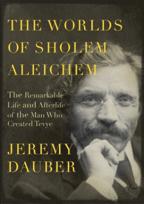
The Worlds of Sholem Aleichem: The Remarkable Life and Afterlife of the Man Who Created Tevye," by Jeffrey Dauber. (Nextbook, Schocken, 2013.)
{mprestriction ids="1"}In the Schocken Publishers Nextbook series, contemporary experts confront the lives of famous men, women and events of the Jewish past. In this biography, Jeffrey Dauber, a professor of Yiddish literature at Columbia University, examines the life of noted Yiddish author and playwright Sholem Aleichem. The result is a fascinating look at the world of Yiddish literature just at the time it was beginning to flourish. Like his contemporaries I. L. Peretz, Chaim Nachman Bialik and others, Sholem Aleichem struggled with language. Should he write Jewish literature in Hebrew, in Russian or in Jargon — as he referred to Yiddish? And with his contemporaries, he was convinced that the Jews of the world deserved a serious literary canon, although his writing was not necessarily serious. He wrote, as Dauber describes it, by finding the laughter within the tears.
Born into a poor family, he managed to marry his rich employer’s daughter and soon managed to lose the great wealth due to hard times and worse business decisions. Becoming a full-time writer, Sholem Aleichem developed an ardent following throughout the Yiddish-speaking world. He gave readings in Ukraine, Russia, Poland, Germany, the United States and other countries to standing room only crowds, his collections of short stories sold millions of copies throughout the world, and he was dubbed "The Jewish Mark Twain." His funeral in New York City was the largest funeral ever seen in the metropolis.
Dauber tells the author’s story in five acts, knowledgeably placing him within his time, showing readers how he developed his art, introducing readers to his family and friends. His anxieties become the readers’ anxieties, his triumphs and failures are also the readers’. Then in 10 short scenes following the author’s death, Dauber describes how Sholem Aleichem became an icon of Jewish literature, often celebrated more for "Fiddler on the Roof" then for his entire oeuvre, often more praised for his depiction of shtetl life because of its disappearance after the Holocaust and the Russian communist regimes’ anti-Jewish policies, then for the genuine brilliance of his writing.
In sum, this biography recreates a man the readers don’t know, makes his life the life of all of us in one way or another and celebrates his writings, not just because of Fiddler on the Roof, but because of how wonderful, humorous and diverse they were.
Andrea Kempf is a retired librarian who speaks throughout the community on various topics related to books and reading.{/mprestriction}